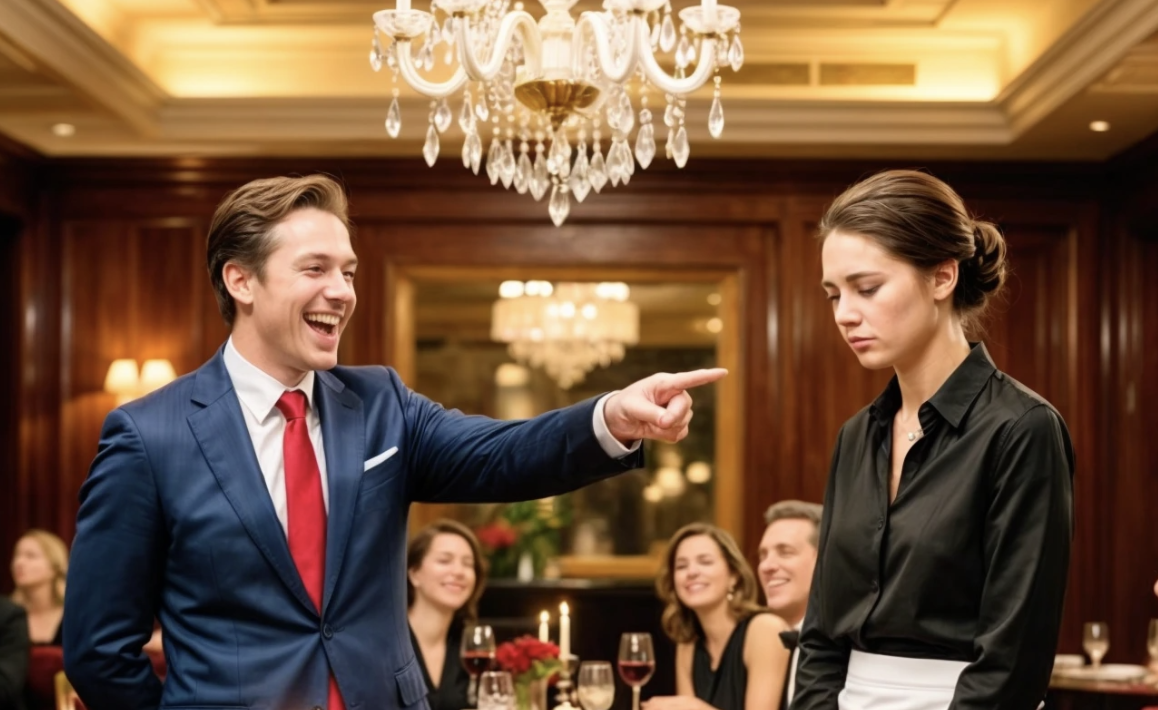The golden light of a Neapolitan evening softly flooded the spacious hall of the Aurora restaurant, tinting the snow-white tablecloths in warm, honeyed hues. The air, dense and saturated, carried a stirring aroma of fresh basil, garlic sizzling in olive oil, and seafood just brought in from the nearby market. At every table a small life was in full swing: cooing couples celebrating anniversaries, boisterous families with loud, laughing children, brisk businessmen discussing their latest deals over glasses of velvety red wine. Amid this lively, radiant splendor, moving like a quiet shadow, was Sofia—a waitress with impeccable posture and tired but incredibly kind eyes the color of ripe almonds. Her movements were practiced and graceful, and her face held a calm, almost detached expression behind which lay an entire universe of unspoken thoughts and quiet sorrow.
On this special evening, when the sun had almost touched the edge of the distant sea, a noisy company burst into the restaurant. At its head was Alessandro—young, but already convinced he was something extraordinary—heir to a vast fortune whose behavior often left much to be desired. His friend, Lorenzo, followed, feeling a light yet persistent guilt and a vague premonition of looming trouble that clutched his heart with cold fingers. Alessandro had just been joking loudly and boorishly with the owner, maître Riccardo, holding forth on the “unsurpassably high standards of Aurora,” which, in his opinion, ought to be raised even further.
— Well then, Riccardo, — Alessandro proclaimed, looking around the hall with the air of an absolute master, — is your entire staff here strict and flawless to a person? What, they even understand foreign guests—the most exacting and demanding—at half a word?
— Without question, Signor Rossi, — Riccardo smiled courteously, skillfully hiding beneath a mask of hospitality a slight perplexity and growing irritation. — We are truly proud of our service and our attention to every wish of our guests, even the most seemingly insignificant.
Catching the attentive, assessing look of Sofia, who was carrying a huge tray of crystal glasses filled with sparkling soft drinks, Alessandro decided first to “test” her, certain that a simple, unremarkable waitress wouldn’t know even basic English. He addressed her sharply, almost proprietorially, snapping his fingers:
— You! Girl! We want to order something truly special, bring us the menu, and be quick about it!
Lorenzo, embarrassed, lowered his gaze to study the patterns on the expensive tablecloth. He, of course, heard his friend’s crude, downright horrifying accent. Sofia, without batting an eye, set the glasses gracefully on the free edge of the table and replied in impeccable, pure British English; her voice sounded wonderfully calm, deep, and melodious—like soft, soothing music:
— Certainly, sir. Welcome to our beloved Aurora. May I have the immense pleasure to suggest our specials for this wonderful evening? The grilled octopus with a delicate lemon zest and fresh herbs is particularly exquisite today, a true symphony of tastes.
Alessandro was taken aback; his self-assured face flushed at once with sudden vexation. At the neighboring table an elegant elderly couple, Monsieur and Madame Leblanc, whispered to each other, nodding warmly and approvingly in Sofia’s direction. Lorenzo felt unpleasant, cold goosebumps run down his back: her English was not merely perfect—it was aristocratic, impeccable, and testified to a splendid, truly brilliant education.
— Parroted phrases, learned by rote, won’t fool anyone and count for nothing, — Alessandro sneered with a dismissive little snort, swiftly switching to Italian in an attempt to reclaim the advantage slipping away from him. — Anyone, even the most uneducated person, can memorize a few fancy sentences, can’t they? But if you serve us throughout the evening in some other, more difficult language… I’ll bet you won’t manage it—you’ll fail!
Maître Riccardo took a firm, decisive step forward; concern and a hint of alarm were written on his face:
— Signor Rossi, I strongly, sincerely beg you…
— What is it, my dear Riccardo? — Alessandro asked with feigned surprise, raising his brows. — I’m not proposing anything improper, indecent, or illegal. On the contrary, I’m offering this sweet, modest girl a very advantageous, simply unbelievably advantageous deal—understand, darling? Serve us—me and my friend—throughout the evening in refined French, and you will receive right now five thousand euros in clean, real money. Well? Think you can handle such a simple, easy task?
Sofia looked at him steadily, without averting her gaze; in her eyes real hurt wrestled with cool, practical calculation. Five thousand… That money could easily cover several long, grueling months of her father’s treatment—more expensive, effective medications—not the ones they were forced to use now, counting every penny! Sofia looked directly and boldly at Alessandro; for a moment their eyes met, and the rich, spoiled idler felt distinctly ill at ease. There was not a trace of fear or obsequiousness in the girl’s face. None at all. Only a strange, enigmatic gleam in her eyes and an unshakable, steely resolve. Sofia drew a slow, deep breath, as though gathering strength before a leap into a dark, unknown abyss.
— Bien sûr, monsieur, — her voice became gentle, soft, and incredibly melodious, with a light, elegant Parisian accent that wrung from Madame Leblanc an involuntary, sincere exclamation of delight. — Je suis à votre entière disposition. Permettez-moi de vous présenter notre carte avec tous ses délices cachés.
What followed was a flawless, most detailed presentation of the menu in fluent, exquisite French. She described each dish with such genuine love for the language itself, with such tenderness and attention to detail, that Monsieur Leblanc, once a famous Parisian chef, quietly teared up and whispered to his wife, his voice trembling with emotion: “Mon Dieu, she speaks like a true poet from the legendary place Saint-Germain—this is simply incredible, marvelous.”
Alessandro was livid—pure fury—and no longer much tried to hide it; his good manners evaporated in an instant. His stake rose at once, as if by magic: he now offered a full fifteen thousand euros for German, so difficult and so musical a language. The pause lasted for a few heavy, unbearable moments; then Sofia, just as easily, freely, and unforcedly, began to speak in the tongue of the great Goethe and Remarque, as if this powerful language, too, were her second nature, her native element. Alessandro could claim whatever he liked—shout it across the hall—but these were not dry, memorized phrases; her speech flowed easily and freely, glinting like a mountain stream; behind it one could feel long years of hard study, exhausting drills, constant practice…
When Sofia finished, the hall first fell into absolute, funereal silence; then came the first timid, uneven claps, which instantly swelled into a storm of genuine, admiring applause. Alessandro sat hunched, his face crimson and twisted with rage; he was thoroughly crushed, annihilated.
— A setup! — he shouted, beside himself, pounding his fist on the table. — Who are you to humiliate me like this? And why are you working here, in this place, like some sort of common… — he broke off, as if even he finally realized how awful, how offensive that sounded and looked from the outside. Alessandro seemed to pull himself together, made an enormous effort, and added in a different, calmer yet still caustic tone:
— And this, by the way, is one of the most difficult and incomprehensible languages in the world, impossible—unimaginable!—to learn! — he pronounced with the air of a supreme, unsurpassed connoisseur of linguistics, spreading his hands.
— That’s not quite so, my young friend, — said a very elegant elderly signora at the next table, quietly but very clearly, her delicate blue hat perfectly poised. — My nephew, for example, managed to master German to a very good, confident level, and not so long ago he was invited to work in Vienna itself; he’s settled in there splendidly.
— Shut up, old woman! — Alessandro snapped harshly and crudely, not even deigning to look at her, his gaze brimming with contempt. — No one here is asking you anything—sit and be quiet in your corner!
The signora’s husband, a dignified gentleman, rose sharply and demanded an immediate public apology from Alessandro. Maître Riccardo hurried to the table; his face showed genuine alarm and resolve.
— Signor Rossi, I implore you—please, stop this unseemly spectacle! Otherwise I will be forced to take the most decisive, strict measures. You are openly and brazenly disturbing our other esteemed guests.
Alessandro measured him with a freezing, annihilating look full of arrogance:
— And what will you do, my dear Riccardo? Order your staff to toss out onto the street your most regular, most generous client who leaves tens of thousands every month in your establishment? Besides, I’m not bothering anyone here—I’m putting on a completely free, unique show for them. They ought to be grateful to me for such entertainment!
Then Lorenzo, unable to bear the shame any longer, stood up abruptly; his face was pale, his hands trembling.
— Alessandro, enough—stop this at once! You are disgracing not only yourself, but me, and everyone around you! — He shoved his chair back with a grating scrape. — I’m leaving. Right now. And I strongly, sincerely recommend you do the same: stop this disgrace—come to your senses!
Snatching up his jacket, Lorenzo hurried out, almost at a run, without looking back. A few minutes later the thoroughly rampaging, unhinged Alessandro, to approving whistles and indignant cries from the whole hall, was politely but firmly escorted from the restaurant by two tall, imperturbable security guards.
Soon the turmoil gradually subsided, and the restaurant slowly, steadily returned to its former measured life. But something had changed forever and irretrievably: Sofia ceased to be invisible, a gray little mouse; now she constantly, every moment, felt the attentive, focused gazes of the patrons upon her. It was a sympathetic, kind, warm attention—but still unusual, strange, and a little oppressive…
An elderly, very sweet signora with kind, incredibly intelligent eyes seated at the table by the window gently beckoned Sofia over.
— My dear, you are simply astonishing—magnificent! — she exclaimed, her voice full of unfeigned tenderness. — How many languages do you know, if it’s not a secret, of course?
Sofia laughed—bright and clear; perhaps it was the first time all evening, so incredibly tense and difficult, that she allowed herself to relax.
— In truth, not so many, honestly, — she replied simply and modestly. — I can speak three quite fluently and confidently: English, French, and German. And two more—Russian and Spanish—I know at about an intermediate, not yet ideal level.
People at the neighboring tables fell silent again, holding their breath to listen to their quiet, heartfelt conversation.
— Forgive my tactlessness, my possible intrusiveness… — the elderly signora went on, her voice trembling with sincere, unaffected concern. — But why is a girl with such a brilliant, truly unique education working here as a simple waitress? It seems so unfair…
— Well, that is quite a fair, natural question, — Sofia lowered her eyes, studying the patterns on the floor. Seeing in the eyes of those around her not only simple curiosity but genuine warmth, she began to speak slowly and deliberately. She told of years of teaching in a private school, then of her own beloved language school—her most cherished creation—which she had been forced to close not only because of the crisis, but also because of her father’s sudden, terrible illness, which required expensive, lengthy treatment; the treatment, in turn, mercilessly devoured her modest budget for promoting the school. She spoke of how she sent her résumé everywhere that might need language teachers or translators, but everywhere received silent, indifferent refusals or polite requests to wait because “at the moment there are unfortunately no vacancies.” But she could not wait—had no right to; her father underwent essential, life-sustaining therapy every week; rent had to be paid; they had to live—simply exist. And this job paid money immediately, in cash, without delays.
— I am not ashamed of my honest work, — she concluded firmly, with quiet dignity. — It feeds me and helps my father—that is what matters most.
The hall was moved to its very core; many patrons furtively wiped away tears. Riccardo, standing at the bar, looked at her with a new, deep, abiding respect. In the six months this neat, incredibly diligent and modest girl had worked here, she had never spoken about herself, never complained, and no one even suspected the deep, harrowing drama hidden behind her calm, unruffled façade.
The guests vied with one another, talking over each other, to press upon her large, very generous tips—two hundred, five hundred euros—“for your father’s treatment, please for the treatment.” Sofia demurred shyly and awkwardly, but people were insistent; their hearts were open, and their eyes shone with kindness.
Just before leaving, that same elderly signora beckoned her gently once more.
— My child, — she said, opening her wrinkled yet well-kept palm. In it lay a small, time-worn silver locket with a swallow in flight. — My mother—may her memory be blessed—survived a terrible war. She always said this little, fragile bird brought her luck—saved her from death. Take it. May it protect you now, my dear.
Sofia wanted to refuse, to say she could not accept so precious and dear an heirloom, but in the old woman’s eyes she saw such firm, almost maternal, unconditional love that she only nodded, closing her trembling fingers around the locket.
— Thank you—thank you endlessly, signora. I will keep it as my greatest, most precious talisman.
The next day, right after her shift, a young man was waiting for Sofia at the restaurant exit. His face seemed vaguely familiar, but she did not immediately recognize in him one of Alessandro’s companions from the night before—the very Alessandro whose failed and nasty joke had helped her change from an invisible shadow into a living, real person with her own dreams, pain, and unique story. Lorenzo was nervously twisting his hat in his hands, though he tried desperately to relax and smile encouragingly.
— Signorina Sofia… — he took an uncertain step forward. — Forgive me for yesterday… for that unseemly spectacle. It was awful, outrageous, inexcusable. I am madly, incredibly ashamed of everything that happened.
Sofia stopped; her face was cold, closed, and distant.
— You have nothing to apologize for, believe me. You didn’t start that ridiculous spectacle. You simply left, and that was the end of it.
— But I couldn’t stop it—I failed to! — and in his voice there suddenly sounded the most genuine, bitter despair. — I… I grew up in Torre Annunziata, in a simple, poor family. My mother worked for many years as a waitress… There was a time when things in our family were going very badly—just awful… I still remember how she came home late at night and sometimes cried quietly into her pillow because of “jokers” like him and their humiliating, hurtful jokes. I was still just a child then, and I hated with all my heart all those rich, spoiled boys who treated working, ordinary people like… like trash, good for nothing. And now—horror of horrors—I keep company with men like Alessandro, because their money and connections are needed for my still so fragile business. I’ve become part of this ugly system that breaks and humiliates people like you—people so bright and strong. Forgive me; I don’t know how to atone for my guilt.
The cold in Sofia’s eyes began to melt slowly, giving way to genuine curiosity and sharp, deep compassion.
— You are not obliged to bear the guilt for the immoral acts of other people—that would be unjust.
— But I bear direct guilt for my own inaction—for my cowardice! — he retorted hotly, with fervor. — And with all my heart I want to fix it, to make amends. Here. — He held out a thick, weighty envelope. — Twenty thousand euros. He promised it publicly, in front of everyone—and now he is simply bound to keep his word. I insisted—was very adamant. Five thousand more than he promised—for moral damage and as my own most sincere personal apology. He himself will not come here and will never apologize—too proud, too stubborn; can’t admit his mistakes.
Sofia recoiled as if she had seen a snake.
— No—that’s too much, I can’t… I… can’t accept this money. I want nothing from him—not a cent.
— You can and you absolutely must accept it! — Lorenzo insisted; in his eyes there was not only deep remorse but the most sincere, unfeigned admiration. — I heard your story yesterday, standing outside by an open window. I couldn’t leave—couldn’t tear myself away. This money is not a handout, not alms. It is your rightful, honestly earned due. And now… — he drew a deep, nervous breath, — I have a very serious business proposition for you. A position as a simultaneous interpreter at my firm—it’s currently vacant. We have important, ongoing partners from Germany and France. We’re not yet ready and do not want to delegate such responsible negotiations to soulless artificial intelligence. In the near future it certainly won’t replace good, talented human specialists… specialists exactly like you, Signorina Sofia. You handle three foreign languages freely, virtuously; last night I had a wonderful, unique chance to see it with my own eyes.
He spoke seriously, businesslike, clearly and judiciously, but at the very last moment his lips curved in a light, kind, encouraging smile. Sofia looked at him, at the envelope trembling in his hand, and felt the last, largest shard of distrust and resentment melt in her chest.
— Are you absolutely sure I can handle such complex, responsible tasks? — she asked quietly, almost in a whisper, looking straight into his eyes.
— I’m sure you’ve already handled far tougher tasks in your life—much harder ones, — he replied just as softly but very firmly; and in his eyes she saw a genuine faith in her.
— May I think it over a little—take a short time-out to reflect?
— Of course—by all means; one should not rush in matters so important, so fateful.
That same evening, sitting by her sleeping father’s bed, Sofia quietly—so as not to wake him—told him everything that had happened and showed him the money and the old, worn locket.
— Papa, do you remember how you once worked three jobs at once, around the clock without days off, so I could get into that prestigious university?
— And do you remember how, at fourteen, you took all the household chores, all the running of the home on yourself so I could rest a little after my exhausting shifts? — he smiled, taking her hand in his weak, emaciated palm. — We have always helped each other, all our lives, my dear, beloved daughter. This locket… and this unexpected offer… This is your chance—your shining hour. Use it—don’t miss it, I beg you. You more than deserve it; you’ve come through so many trials.
Without much hesitation, Sofia accepted Lorenzo’s offer, feeling that this was the beginning of something new, bright, and important.
Three months later, a successful, self-assured young woman in an elegant, tailored business suit walked down a street she knew and loved. Popping into Aurora for a minute, she saw Riccardo behind the counter, animatedly discussing something with his barman.
— Sofia! — he exclaimed with genuine delight, his face lighting up in a broad, warm smile. — How are things in the big, serious world of business? I suppose all the contracts are signed and all the negotiations done?
— Wonderfully, Riccardo—honestly, I couldn’t be happier! — she was radiant; her eyes sparkled. — I just dropped in for a quick coffee and to see how our beloved Aurora is doing.
— You truly are a remarkable, unique person, Sofia. And I am immeasurably, endlessly happy that you once worked here with me, though for you it was probably far from the best, far from the brightest time in your life.
— Do you really think so, Riccardo? Thank you for those warm, precious words. You were always very kind to me—very caring. Because of me you lost one of your dearest, most generous regulars, and yet not once, not with a single word, did you reproach me for that crazy evening.
The maître looked at her seriously and intently; his gaze was full of respect:
— I didn’t lose him because of you, my dear Sofia. The reputation of my establishment, and the honor and dignity of my staff—those are what I hold dearest; and that ill-bred daddy’s boy crossed every conceivable line that night. Besides… when something goes down in one place, it is sure to come back from another—with interest. That is the unspoken yet inexorable law of life and business, — he added with a roguish, friendly wink. — Now your new boss, Lorenzo Mancini, has taken to stopping by often—practically every day—for lunch or dinner. He asks about you. In great detail and with great interest; I’d even say with very close attention. It seems you made an indelible, very strong impression on him. And not only with your brilliant languages, believe me.
Sofia smiled, looking at her reflection in the restaurant’s huge, spotless window. The place had once been for her both a temporary prison and a salvation, a quiet harbor. Her fingers, involuntarily and out of habit, found at her neck the cold, yet so dearly cherished silver locket. Her life was making a new, dizzying turn, and ahead—she felt it—there lay so much light, so many wonderful possibilities waiting to be discovered like a new, clean, unmarked page in the book of her fate.
And in the silence of her heart’s hall, where once there had been only the whisper of doubts and the drone of anxieties, a melody of hope now settled forever—quiet and beautiful, like the distant yet dearly desired song of a swallow gliding high in the cloudless sky over the eternal, boundless sea



